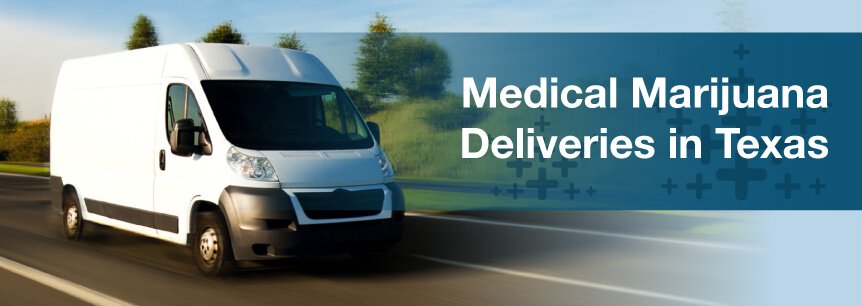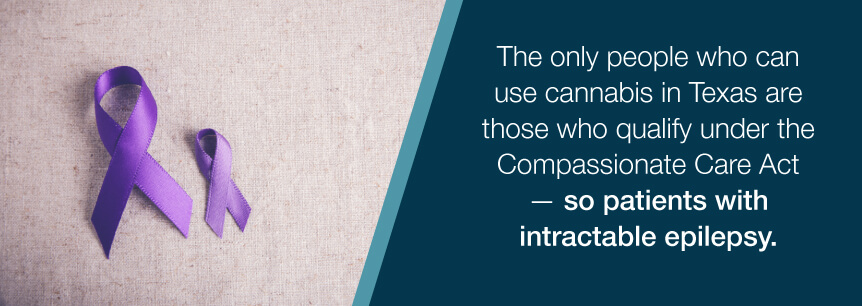
On Thursday, February 1, 2018, a six-year-old girl became the first medical marijuana patient in Texas to receive a legal home delivery of her medicine, which was grown and produced in the state. Knox Medical, a dispensary in the state, is the Texas marijuana delivery service that brought the medicine to her door.
After the state passed the Compassionate Use Act in 2016, people diagnosed with intractable epilepsy have been legally able to purchase CBD products from one of the state’s three approved dispensing organizations — one of which is Knox Medical. Qualifying patients must first receive a recommendation from both a board-certified neurologist and another unbiased doctor.
What are the benefits of medical marijuana deliveries, and how do they work in the state of Texas?
There are several reasons patients and the state government can benefit from medical marijuana deliveries, including:
Since marijuana is technically still a Schedule I drug in the eyes of the federal government — as well as illegal in the state of Texas, aside from those who qualify under the Compassionate Use Act — possessing it when you aren’t a patient yourself is a strange grey area in many states.
3. Safety and Security
Since there are currently only three dispensaries in Texas, patients can order deliveries with confidence that the companies are reputable. The services require their deliveries to be made by a nurse or social worker, who will arrive in a marked vehicle and a uniform.
Patients will know they’re getting the type and amount of medicine they ordered from one of the three reliable sources in the state.
There are a few stipulations to medical marijuana deliveries in Texas, mostly due to the state’s lack of a medical marijuana program. Remember, the only people who can use cannabis in Texas are those who qualify under the Compassionate Care Act — so patients with intractable epilepsy. Anyone else will still be persecuted for using or possessing marijuana.

Plus, even epileptic patients are limited in the type of medicine they can use. The state only approves medical cannabis products that are high in CBD content and extremely low in THC content. The medicinal marijuana in Texas must have a THC content of 0.5 percent or less, according to the Texas Occupations Code Sec 169.001. Lawmakers are stressing this stipulation.
What’s the difference between THC and CBD? The two cannabinoids vary in the effects they provide the user. THC, or tetrahydrocannabinol, is the component of marijuana that makes the user feel “high” and creates other psychoactive effects. CBD, or cannabidiol, does not affect the patient in that way. Instead, it provides medical benefits and a relaxation effect without altering the patient’s state of mind.
Delivery services would only be allowed to provide patients with the medicines covered by the act. Once a patient has received a recommendation from their doctor, one of the three companies will be able to deliver the medicine to any patient in the state.
Texas is in the minority when it comes to medical marijuana programs in the United States. As of now, 29 states and Washington, D.C., have legalized cannabis for either medicinal or recreational purposes. That leaves Texas and 20 other states that have yet to develop a statewide program to address cannabis use.
The initiation of a delivery service in Texas is just one way the state is moving in the right direction to legalize cannabis for medicinal use across the board. Marijuana can treat several other chronic, life-threatening conditions that people in Texas are suffering from. Hopefully, the positive effect the medication has on epileptic patients will persuade lawmakers to create a more inclusive statewide medical cannabis program.
If you or someone you know is suffering from a chronic condition that causes them pain, nausea or any other symptoms treatable by medical marijuana, don’t waste any more time. If your state has legalized medical cannabis, search our database to find a reliable cannabis doctor or knowledgeable dispensary staff near you.
For those who live somewhere where cannabis is still illegal, don’t lose hope. Keep checking our blog for updates on marijuana reform throughout the country.
No Information on MarijuanaDoctors.Com should be used to diagnose, treat, prevent or cure any disease or condition. You can view our Full Disclaimer here.